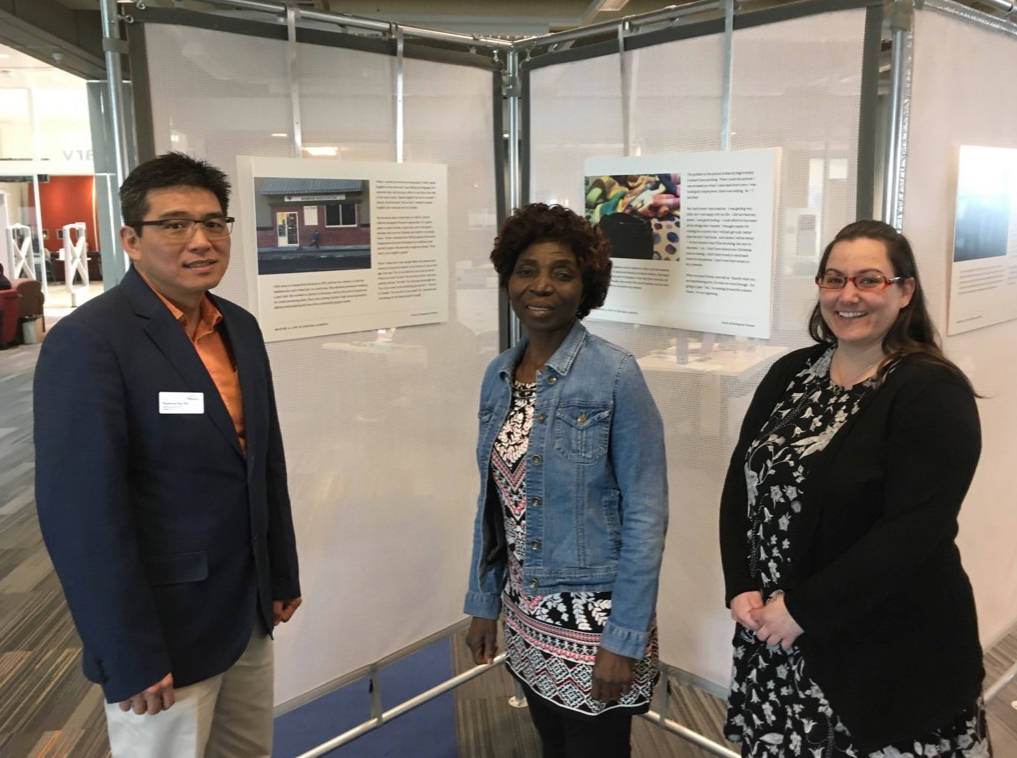Red Deer College and Central Alberta Immigrant Women’s Association (CIAWA) have joined forces to present a Photovoice exhibit called ‘Making a Life in Central Alberta: Voices of Immigrant Women’.
This exhibition, on display in the RDC Library through to May 18th, is part of the three-year research project, ‘Making Life Easier: A Participatory Assessment of Services for Immigrant Women in Central Alberta’.
In partnership with CAIWA, the RDC team connected with immigrant women to learn about their settlement experiences with the intention of identifying the strengths and weaknesses of settlement programs and services.
Immigrant women participating in the research were invited to share their experience through an activity called Photovoice.
They captured photographs to represent important aspects of their settlement experiences.
Then, they took part in interviews where they talked about the photographs they had made and told their stories of settling and making a life in Central Alberta.
The photographs and interviews were completed between 2016 and 2017.
“We have a long-standing partnership with the Central Alberta Immigrant Women’s Association,” explained Dr. Choon-Lee Chai, RDC Sociology instructor and project lead. The project, which is led by Chai and Dr. Krista Robson, assesses settlement programs and services for immigrant women locally. “I think Photovoice as a research project is unique because it gives participants more autonomy and more room to express themselves,” he added.
A simple survey can’t capture the ‘bigger picture’ of what participants might be trying to get across.
Photos reflect those settlement experiences in a stronger, clearer way.
“The processes of taking, selecting and interpreting the pictures demands a level of focus and concentration,” he said. “Which pictures will they discuss with the (added) research?”
These photographs and stories tell the experience of women who have immigrated to Canada and settled in the local region. Themes cover the gamut from optimism, ambition, achievement, love, family, children to faith, friendship, new opportunities and new discoveries.
They also speak of issues ranging from social isolation, discrimination to service gaps.
“We tried to have as much variety as possible in one exhibition to let people know that immigrant women have all kinds of experiences,” he said. “Especially when you first arrive in a foreign country, to be able to connect with someone who shares a similar experience – that is priceless.”
Tabitha Phiri, research project coordinator at CIAWA, said that she hopes visitors to the exhibit walk away with a greater understanding of the experiences of newcomers.
“They can better understand their feelings, their aspirations, their hopes. Sometimes, we take immigrants for granted. We think they are here for protection, especially when they come from countries where there are wars, starvation.”
But newcomers to Canada bring aspirations for greater things as well, she said.
“They are looking forward to accomplishing something – maybe they had some experiences prior to coming here and they are hoping to see those fulfilled by coming to Canada in a country where there is freedom.”
She said pictures make the messages come through in a more profound way.
“That way, they are able to articulate some things they might not be able to do if they were just interviewed,” she said, adding that the tool of utilizing images served to motivate them to tell their own stories that much more.
“As we did this, I noticed a change. When we started doing interviews, their interest was kind of low. But when they started getting cameras and taking pictures and being told they were going to explain their stories through their pictures – they were so excited.
“I would like people to know that immigrants are educated. They are experienced.
They need to have opportunities and chances to show their expertise and to put to use what they may have gained from their countries of origin.”
With more knowledge about immigrants’ experiences comes change for the better, she said.
“I’m happy because some things are beginning to change already through this project.”
As mentioned, the exhibit runs through to May 18th in the RDC Library.



